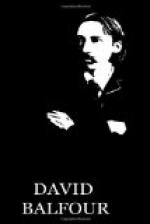* * * * *
CHAPTER XV
BLACK ANDIE’S TALE OF TOD LAPRAIK
I have yet said little of the Highlanders. They were all three of the followers of James More, which bound the accusation very tight about their master’s neck. All understood a word or two of English; but Neil was the only one who judged he had enough of it for general converse, in which (when once he got embarked) his company was often tempted to the contrary opinion. They were tractable, simple creatures; showed much more courtesy than might have been expected from their raggedness and their uncouth appearance, and fell spontaneously to be like three servants for Andie and myself.
Dwelling in that isolated place, in the old falling ruins of a prison, and among endless strange sounds of the sea and the sea-birds, I thought I perceived in them early the effects of superstitious fear. When there was nothing doing they would either lie and sleep, for which their appetite appeared insatiable, or Neil would entertain the others with stories which seemed always of a terrifying strain. If neither of these delights were within reach—if perhaps two were sleeping and the third could find no means to follow their example—I would see him sit and listen and look about him in a progression of uneasiness, starting, his face blenching, his hands clutched, a man strung like a bow. The nature of these fears I had never an occasion to find out, but the sight of them was catching, and the nature of the place that we were in favourable to alarms. I can find no word for it in the English, but Andie had an expression for it in the Scots from which he never varied.
“Ay,” he would say, “it’s an unco place, the Bass.” It is so I always think of it. It was an unco place by night, unco by day; and these were unco sounds, of the calling of the solans, and the plash of the sea and the rock echoes, that hung continually in our ears. It was chiefly so in moderate weather. When the waves were anyway great they roared about the rock like thunder and the drums of armies, dreadful but merry to hear; and it was in the calm days that a man could daunt himself with listening—not a Highlandman only, as I several times experimented on myself, so many still, hollow noises haunted and reverberated in the porches of the rock.
This brings me to a story I heard, and a scene I took part in, which quite changed our terms of living, and had a great effect on my departure. It chanced one night I fell in a muse beside the fire and (that little air of Alan’s coming back to my memory) began to whistle. A hand was laid upon my arm, and the voice of Neil bade me to stop, for it was not “canny musics.”
“Not canny?” I asked. “How can that be?”
“Na,” said he; “it will be made by a bogle and her wanting ta heid upon his body."[13]
“Well,” said I, “there can be no bogles here, Neil; for it’s not likely they would fash themselves to frighten solan geese.”




